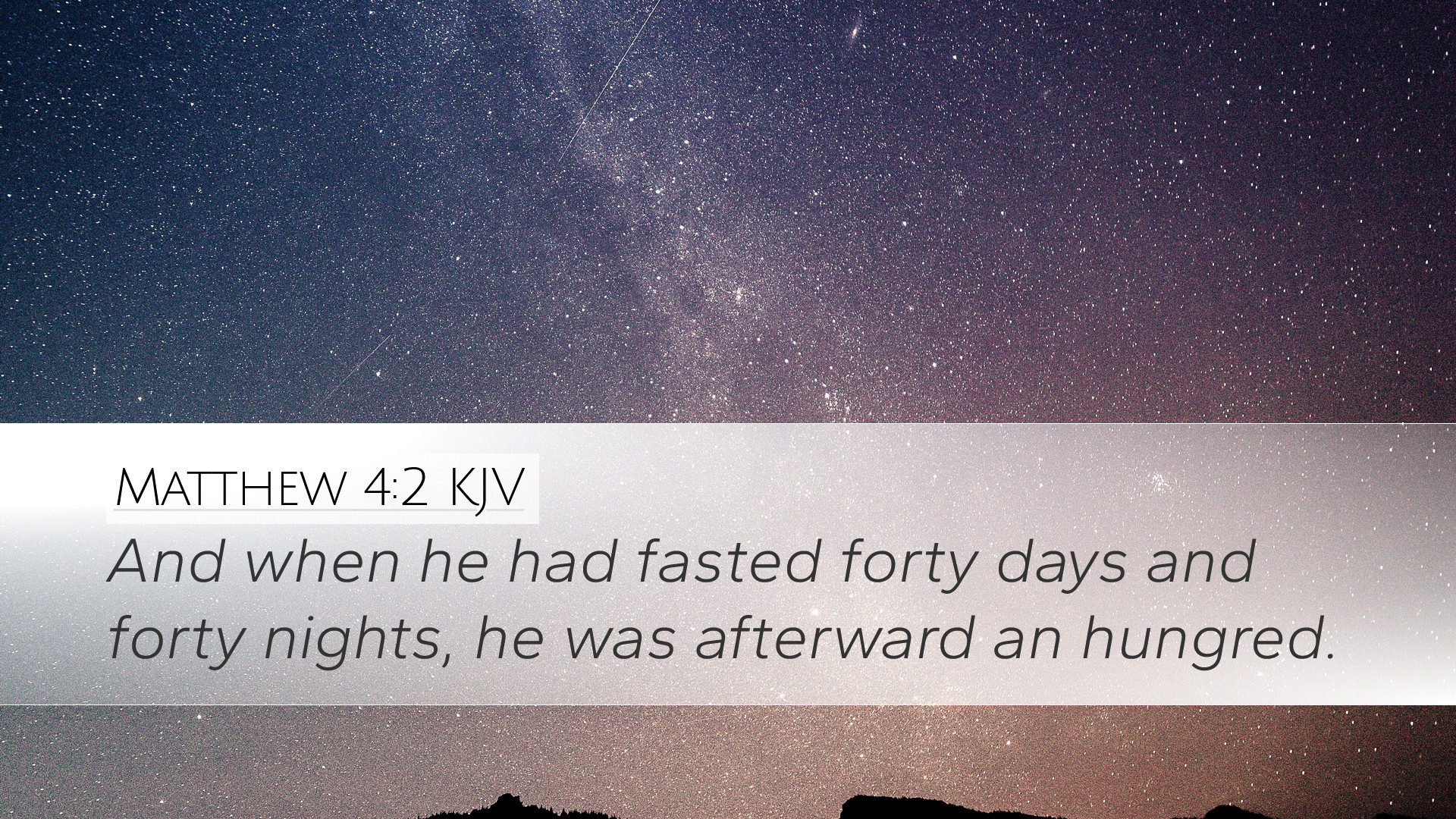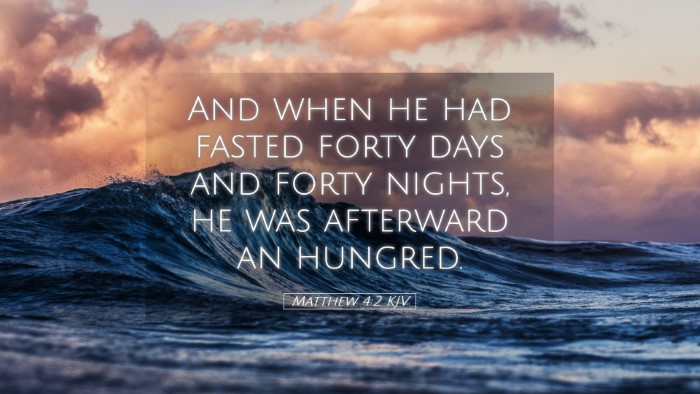Commentary on Matthew 4:2
Bible Verse: Matthew 4:2 - "And when he had fasted forty days and forty nights, he was afterward an hungred."
Introduction
This verse marks a pivotal moment in the Gospel of Matthew, where Jesus prepares for His public ministry. The fast of forty days and nights serves not merely as a physical trial but also as a profound spiritual preparation. As we draw from the insights of esteemed commentaries, we will explore the significance of this event for understanding Jesus' identity, His mission, and the patterns of spiritual discipline.
Context and Significance
The passage occurs immediately after Jesus’ baptism (Matthew 3:16-17), where He is publicly affirmed by the Father. It is vital to note that this fast places Jesus in a position to confront the temptations from Satan that will follow. Both Albert Barnes and Adam Clarke emphasize that Jesus’ withdrawal into the wilderness highlights a deliberate act of preparation, akin to the Israelites' 40 years in the desert and Moses’ fasts before meeting God. This period thus symbolizes a new exodus, ushering in the Kingdom of Heaven.
The Nature of the Fast
- Spiritually Driven: According to Matthew Henry, Jesus' fast is not merely an act of abstaining from food but a profound spiritual exercise. It signifies a deeper communion with God, marking Jesus' dependence upon His Father.
- Physical State: The mention of fasting for 40 days suggests an extreme state of physical weakness. Clarke notes that such an extended fast is not customary and indicates a special preparation for a special mission.
- Preparation for Temptation: The 40 days serve a dual purpose: to affirm Jesus' humanity and to prepare Him to face the forthcoming temptations from Satan. Barnes notes that this period is essential for underscoring Jesus' readiness to undertake His redemptive mission.
Spiritual Implications
Model for Believers: This passage encourages believers to engage in spiritual disciplines such as fasting, prayer, and solitude. As stated by Henry, Jesus demonstrates that spiritual vitality often necessitates the forgoing of physical sustenance to seek God's will deeply.
Understanding Weakness: The phrase "afterward an hungred" acknowledges Jesus' human nature. This vulnerability allows believers to relate to Him in their struggles. Clarke asserts that the acknowledgment of hunger enhances the reader's understanding of Jesus as both fully God and fully man.
Victory Through Dependence: The fast is a testament to finding strength through weakness. It illustrates the Christian principle that when we acknowledge our limitations, we allow God’s strength to be perfected in us. As Barnes suggests, true strength often arises from dependency upon God, especially in times of testing.
Theological Reflections
- The Humanity of Christ: This verse reinforces the dual nature of Christ, echoing themes found throughout the Gospels. Henry notes the importance of recognizing Jesus' experiences as real and relatable, inviting a personal understanding of his humanity.
- Preparation for Ministry: Jesus’ fasting is preparatory not only for His own ministry but also serves as a model for all future ministry. Clarke argues that all who serve God must spend time in preparation, seeking His Will before venturing into public ministry.
- Role of the Spirit: Jesus’ action follows the Father’s endorsement at baptism and is led by the Spirit into the wilderness (Matthew 4:1). Thus, it can be deduced that spiritual empowerment is crucial for confronting challenges.
Conclusion
The fasting of Jesus in Matthew 4:2 stands as a profound example for believers. It emphasizes themes of preparation, dependence, and the blend of human vulnerability with divine strength. As pastors, students, theologians, and Bible scholars meditate on this verse, it is crucial to appreciate its theological depth and its practical implications for spiritual disciplines today.
By reflecting on this passage, all are called to a deeper commitment in their faith journey, to seek God through fasting and prayer, recognizing that true sustenance comes from Him alone. This preparation not only honors Christ’s example but also aligns the believer with the powerful mission to which they are called.


